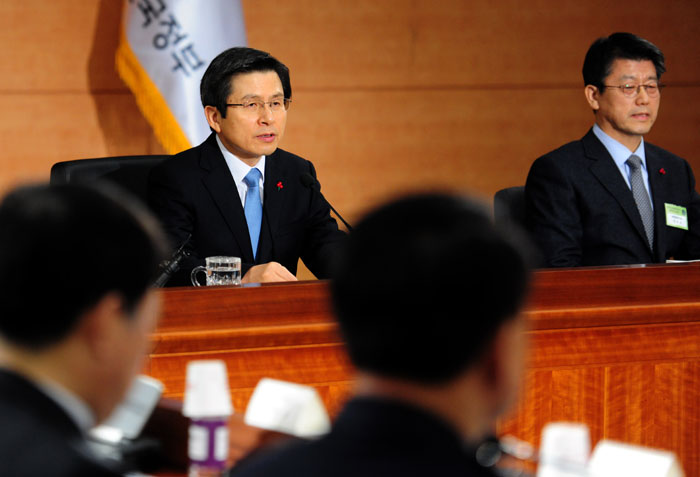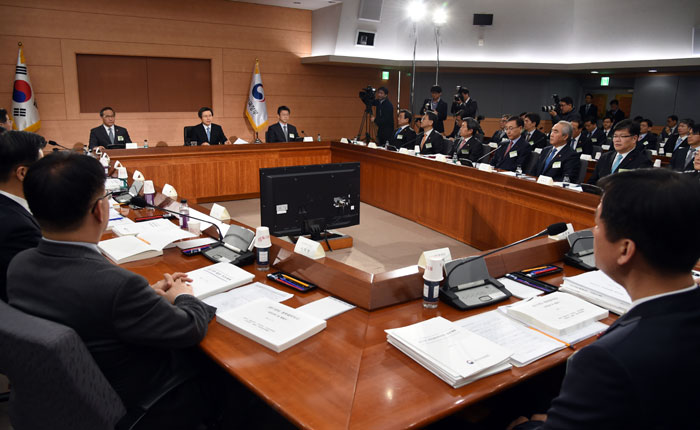-
 Korea.net's 24-hour YouTube channel
Korea.net's 24-hour YouTube channel- NEWS FOCUS
- ABOUT KOREA
- EVENTS
- RESOURCES
- GOVERNMENT
- ABOUT US

Acting President Hwang Kyo-ahn (left) calls for government ministries to work hard for the stability of people's livelihoods and for public safety, during a government policy briefing at Government Complex-Seoul on Jan. 11.
The government will create more than 10,000 jobs in the public sector in order to revitalize the economy.
It will strive to boost the convenience of people's lives by achieving its goal of creating future-forward online government services, and by achieving its goal of fully realizing "Government 3.0" services as they become embedded in people's day-to-day lives. The Ministry of the Interior announced its annual policy plan at a government policy briefing on Jan. 11, and the theme of the meeting was “safety of the people, law and order.”
The ministry will create more than 10,000 jobs in the public sector, which includes public safety, education and welfare. To help workers manage both work and home more easily, the ministry will also create on a large scale more part-time positions. To this end, it will create 3,600 jobs in the field of security and public safety, such as police officers, maritime police and firefighters. It will also recruit 630 special education teachers in kindergartens, and create 3,600 jobs in the social welfare sector.
In the case of Terminal 1 at Incheon International Airport, which needs a heightened level of security, the ministry said it will create more jobs in the arrivals hall, customs, the quarantine area, and at general employment and welfare centers, aiming to create more than 100 part-time jobs.

Seven government ministries announced their annual policy plans at a policy briefing session that focused on public safety and law and order, in Seoul on Jan. 11.
The ministry will also concentrate on realizing its goal of developing "Government 3.0" online services so as to make people's lives more convenient. One such service is the so-called “one-stop moving service” that will be introduced this year. It will help people update their home address automatically after moving. All they need to do is to visit one local district office to register the new address, and that will enable them to change their new address all at once.
The government will expand online "Government 3.0" services that target multicultural families and non-Korean residents. The ministry will establish a “multicultural migrants service center” where people can receive all sorts of support services at one place. In the past, non-Korean residents used to receive support services from different organizations, separately, including multicultural family support centers, support centers for foreign workers, social integration programs and foreigner support centers.
Another area of improvement will be e-government. To mark the 50th anniversary of the introduction of online government services, the ministry will create a new, intelligent e-government that is equipped with new technologies, such as artificial intelligence, and which will make use of big data. It will integrate and connect the existing 280 kinds of administrative e- government services into the new system, and adopt a so-called “digital one pass” so that users can use all government services by simply logging in with one single ID. The government will also introduce various verification measures, such as finger prints and iris scans, rather than the existing certificate verification system.
By Yoon Sojung
Korea.net Staff Writer
Photos: Prime Minister’s Office
arete@korea.kr
Most popular
- China warmly welcomes first Korea-born giant panda Fu Bao
- First hearing-impaired K-pop act hopes for 'barrier-free world'
- Novelist Hwang's 'Mater 2-10' shortlisted for Int'l Booker Prize
- Expats could account for 7% of population in 20 years: report
- Nat'l Fire Agency picks 137 elite staff for deployment abroad













